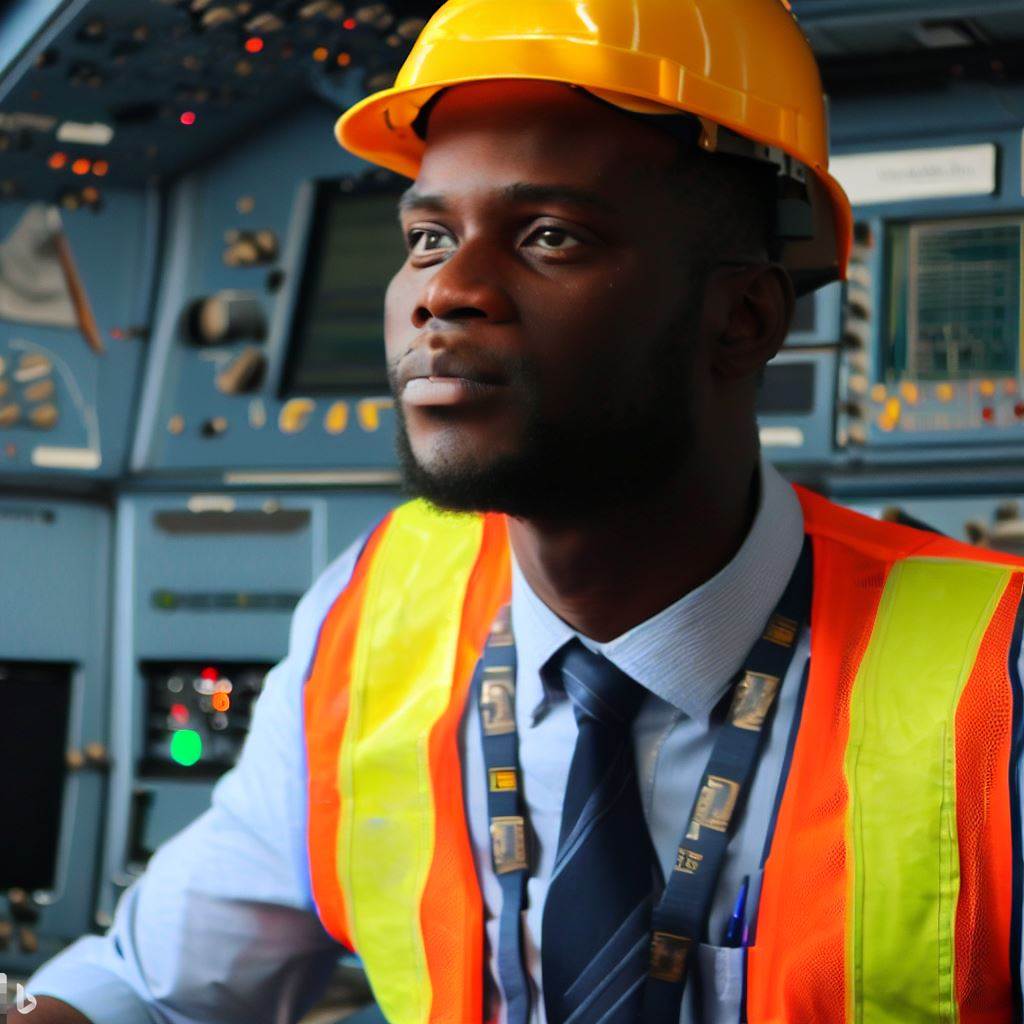Introduction
The working conditions of flight engineers in Nigeria play a crucial role in ensuring safe and efficient air travel. Flight engineers in Nigeria play a vital role in ensuring the safety and efficiency of air travel.
These skilled professionals are responsible for monitoring and maintaining aircraft systems during flight, making their role indispensable in the aviation industry.
As with any profession, the working conditions of flight engineers are essential to their performance and well-being. Let us delve into the factors that shape their work environment and explore how Nigeria addresses the needs and challenges faced by these dedicated individuals.
From the rigorous training they undergo to the demands of working in a dynamic and fast-paced industry, understanding the working conditions of flight engineers sheds light on the dedication and professionalism they bring to the skies.
Join us as we take a closer look at the experiences and challenges faced by flight engineers in Nigeria and the measures taken to ensure their success in the pursuit of safer and smoother flights.
Job Description of Flight Engineers
Flight engineers play a crucial role in ensuring safe and efficient air travel. Here are the key points about their job description, responsibilities, and skills:
Highly trained flight engineers monitor and maintain aircraft systems, working closely with pilots to manage technical aspects. They conduct pre-flight checks, ensuring proper system functionality.
Flight engineers are integral to flight crew safety, monitoring and controlling fuel, engines, hydraulics, and electrical systems. Collaborating with the flight crew, they ensure a smooth and efficient flight experience for passengers.
Flight engineers require extensive knowledge of aircraft systems, adept at troubleshooting malfunctions mid-flight. Proficiency in reading instrument panels and adherence to aviation regulations are crucial.
Additionally, they are required to make quick decisions in critical situations. This is why effective communication ensures seamless interaction with the flight crew, accurately relaying information.
Basically, flight engineers have a critical role in the aviation industry. They ensure the safe and smooth operation of aircraft systems during flight.
Read: Professional Networking for Electrical Engineer in Nigeria
Working Hours and Schedule
Flight engineers in Nigeria work under unique and demanding schedules to ensure the safety and efficiency of air travel. Their responsibilities require flexibility and adaptability, as flight operations can be unpredictable. Here are some key points regarding their working hours and schedules:
- Long and Irregular Hours: Flight engineers work long hours, often starting early in the morning. Their schedule may extend into late evenings or early mornings due to flight operations.
- Standby Availability: Flight engineers must be available on standby, ready to report for duty at short notice. This readiness is crucial for addressing any unexpected technical issues or emergency situations.
- Working on Weekends and Holidays: Flight engineers may work on weekends, public holidays, and festive seasons as flights operate year-round to meet passenger demand.
- Variable Schedule: The flight engineer’s schedule depends on flight operations and aircraft maintenance requirements. They may work on multiple flights in a day, leading to irregular hours.
- Adaptability and Flexibility: Flight engineers must remain adaptable and flexible to cope with changing flight schedules and unforeseen circumstances.
- Peak Travel Seasons: During peak travel seasons, flight engineers may be required to work longer hours to accommodate increased air travel demand.
- Aircraft Type and Maintenance: The schedule of flight engineers may vary based on the type of aircraft they are assigned to and the maintenance needs of the fleet.
- Travel and Time Away: Flight engineers may travel within Nigeria and internationally, leading to extended periods away from home.
- Last-Minute Changes: Flight schedules can change at short notice due to operational requirements, weather conditions, or other factors, necessitating quick adjustments.
- Rest Periods and Compliance: Flight engineers must adhere to aviation authority regulations regarding rest periods to ensure their well-being and performance.
- Coordination with Crew and Staff: Effective communication and coordination with other crew members and staff are essential for seamless flight operations.
Overall, the working hours and schedule of flight engineers in Nigeria can vary significantly depending on various factors. Their job requires flexibility, adaptability, and a willingness to work irregular hours.
Read: Profiles of Heroes: Notable Nigerian Military Figures
Workplace Environment
Flight engineers in Nigeria face challenging working conditions. They ensure safe aircraft operation by monitoring and maintaining systems.
Flight engineers face high noise levels from aircraft engines, which can lead to hearing issues. They must wear proper hearing protection for their well-being.
Cabin pressure is another important aspect of the working conditions for flight engineers. Pressurization systems help maintain a comfortable environment inside the aircraft cabin, especially at higher altitudes.
Flight engineers must be familiar with these systems and ensure they function correctly to prevent any adverse effects on the passengers and crew. Additionally, they need to be aware of the potential risks of rapid decompression and know how to respond effectively.
Moreover, flight engineers must manage temperature fluctuations in aircraft cabins during long flights. They ensure passenger and crew comfort and safety, and troubleshoot heating and cooling systems as needed.
Flight engineers face general workplace challenges, like working in confined spaces such as the cockpit or avionics bay. They must stay highly alert and focused to avoid critical errors.
Moving on, flight engineers in Nigeria may encounter challenges due to limited resources and infrastructure, affecting their efficiency and well-being. Inadequate maintenance facilities can lead to increased workload and stress.
To address these challenges, airlines, and aviation authorities must prioritize flight engineers’ well-being. Proper training on managing working conditions, including noise levels and cabin pressure, is crucial. Investing in advanced equipment can also ease physical strain.
In essence, flight engineers in Nigeria face demanding working conditions. Prioritizing their well-being and providing necessary resources and support is essential to ensure safe and comfortable flights for passengers and crew.
Read: International Exposure for Nigerian Flight Engineers
Safety Measures and Regulations
Safety Measures and Regulations for Flight Engineers in Nigeria
Flight engineers in Nigeria are protected by strict safety measures and regulations. These measures are implemented to ensure the well-being and security of flight engineers.
One important regulation is the requirement for flight engineers to undergo regular training and certification. Training programs cover emergency procedures, safety protocols, and the proper operation of equipment.
Flight engineers must possess a deep understanding of safety guidelines and regulations.
Another crucial safety measure is the implementation of regular aircraft maintenance and inspections. Ensuring that the aircraft is in optimal condition greatly reduces the risk of accidents.
Furthermore, flight engineers are required to conduct pre-flight inspections to identify potential hazards.
By doing so, they can address any issues before the aircraft takes off.
Adhering to safety protocols is of utmost importance in the aviation industry. Failure to follow these protocols can have serious consequences, risking the lives of passengers and crew.
Flight engineers play a vital role in maintaining and upholding these safety protocols. This includes correctly operating the aircraft’s systems and following all safety procedures.
The importance of adhering to safety protocols in the aviation industry
The aviation industry operates under strict regulations, primarily to prioritize the safety of everyone involved. Adhering to these safety protocols is of utmost importance as it guarantees a high level of safety and minimizes the chances of accidents.
Flight engineers play a critical role in upholding safety standards. They follow rigorous safety measures to protect both themselves and the passengers.
Thorough checks, including inspections of all systems, instruments, and equipment, ensure that the aircraft operates optimally before and during flight. By doing so, they significantly reduce the possibility of equipment failure during the journey.
Moreover, strict adherence to safety protocols minimizes the risk of human error and negligence. Flight engineers undergo extensive training to handle emergency situations efficiently, minimizing potential harm in critical situations.
Compliance with safety regulations not only ensures the well-being of passengers but also contributes to building trust and confidence in the aviation industry. Passengers are more likely to choose airlines that prioritize safety measures, thus reinforcing the significance of adhering to safety protocols.
In Nigeria, flight engineers undergo continuous training and monitoring to ensure they comply with safety regulations. These measures serve as a constant reminder of the crucial role safety plays in the aviation industry.
Essentially, upholding safety protocols is essential for maintaining a positive industry reputation and ensuring the continued growth and success of air travel.
Read: Flight Engineers: The Backbone of Nigeria’s Aviation Safety

Challenges Faced by Flight Engineers in Nigeria
Flight engineers in Nigeria encounter various challenges that affect their job performance and flight safety. This section will identify and address these common challenges.
- Limited Career Growth Opportunities: Flight engineers in Nigeria encounter limited career advancement opportunities due to the hierarchical structure of the aviation industry, where pilots are prioritized. This may lead to feelings of undervaluation and hinder career growth.
- Inadequate Training and Equipment: In Nigeria, flight engineers face challenges due to inadequate training facilities and outdated equipment, impacting their growth and flight safety.
- Maintenance Issues: Flight engineers in Nigeria encounter challenges in aircraft maintenance, including delays and inadequate schedules, impacting their job performance and workload.
- Lack of Awareness and Recognition: Flight engineers in Nigeria face issues of insufficient awareness and recognition in the aviation industry, impacting their motivation and job satisfaction.
- Safety Concerns: In Nigeria, flight engineers may lack the authority to address safety concerns effectively, impacting the aviation industry’s overall safety culture.
- Limited Compensation: Flight engineers in Nigeria may face wage disparity with pilots, leading to dissatisfaction and a potential impact on job performance.
- Lack of Regulatory Framework: Nigeria lacks a robust regulatory framework for flight engineers, hindering the establishment and enforcement of essential standards and guidelines.
- Communication Barriers: Flight engineers in Nigeria may face communication barriers, including language diversity, technological limitations, or inadequate systems, hindering seamless collaboration with other crew members.
Flight engineers in Nigeria face challenges like limited career growth, inadequate training, maintenance issues, and safety concerns. Stakeholders must address these to ensure their well-being and effectiveness.
Support Systems and Training
Flight engineers in Nigeria have access to various support systems that play a crucial role in ensuring their overall well-being and success in their profession. Some of the support systems available include:
- Affiliation with Professional Associations: Flight engineers can join professional organizations such as the Nigerian Society of Engineers for networking, mentorship, and access to resources.
- Technical Support: Airlines provide flight engineers with dedicated technical support teams to address any maintenance or operational issues.
- Employee Assistance Programs: These programs offer flight engineers access to counseling services, financial assistance, and work-life balance initiatives.
- Healthcare Benefits: Flight engineers receive comprehensive medical coverage to address any health-related concerns.
- Legal Assistance: In case of any disputes or legal matters, flight engineers can rely on legal support provided by their employers or unions.
- Union Representation: Flight engineers can join unions that negotiate on their behalf for better working conditions, pay, and benefits.
- Social Support: Airlines often organize social events and gatherings to foster camaraderie and provide a sense of community among flight engineers.
Importance of Continuous Training and Professional Development
Continuous training and professional development hold significant importance for flight engineers in Nigeria, given the dynamic nature of aviation technology and the need for up-to-date skills.
Regular training is vital as it ensures that flight engineers are well-prepared to handle emergencies and stay abreast of new aircraft technologies.
Ongoing training programs not only keep flight engineers current with industry advancements but also enhance their problem-solving abilities and promote innovative thinking. This fosters adaptability and resourcefulness, key attributes for successfully navigating the evolving aviation landscape.
In addition to technical knowledge, continuous professional development focuses on soft skills like communication and teamwork. These skills are vital for effective collaboration within the aviation industry, ensuring smooth operations and seamless coordination between crew members.
Compliance with safety regulations and industry standards is a crucial aspect of flight engineering. Continuous training ensures that flight engineers stay updated on the latest safety protocols and best practices, reducing the risk of errors and enhancing overall safety.
Furthermore, professional development opportunities enable flight engineers to advance in their careers. By acquiring new skills and knowledge, they can take on leadership roles within the industry, contributing to its growth and success.
For airlines, investing in continuous training for their flight engineers demonstrates a commitment to employee development and overall operational excellence. It also instills confidence in passengers, knowing that their safety is in the hands of well-trained and competent professionals.
Efforts to Improve Working Conditions
Flight engineers are vital for safe air travel in Nigeria. Initiatives improve their working conditions and effectiveness.
Here are some notable initiatives and efforts that have been implemented to improve the working conditions of flight engineers in Nigeria:
- Training and Skill Development: Recently, Nigeria has seen a rise in training and skill development programs for flight engineers. These initiatives aim to enhance technical expertise and proficiency in aircraft systems, enabling them to handle challenges and emergencies effectively.
- Improved Safety Standards: The Nigerian Civil Aviation Authority (NCAA) enforces strict safety regulations for flight engineers, covering maintenance, emergency procedures, and international aviation standards. These measures prioritize their well-being and instill confidence in their work.
- Enhanced Compensation Packages: Recognizing flight engineers’ significance, the aviation industry has improved compensation packages, offering competitive salaries, healthcare, insurance, and travel allowances. Fair remuneration boosts their morale and dedication to their duties.
- Modernized Equipment and Technology: In Nigeria, airlines and aviation organizations invest in modernizing equipment and technology. Upgrades to flight simulators, maintenance tools, and communication systems enhance flight engineers’ productivity and efficiency, creating better working conditions.
- Collaboration and Partnerships: Industry stakeholders collaborate to improve working conditions for flight engineers in Nigeria. Dialogues, partnerships, and solutions implementation foster a positive working environment, ensuring continuous enhancement for flight engineers.
- Career Progression Opportunities: Flight engineers in Nigeria have access to career progression opportunities, like training and certification for senior positions. These avenues encourage excellence and contribute to the aviation industry’s improvement.
These recent efforts have improved flight engineers’ working conditions in Nigeria, providing better facilities, safety measures, and career growth opportunities. Regular evaluations are needed to sustain these improvements. These initiatives enhance air travel safety and efficiency while fostering a conducive environment for flight engineers.
Conclusion
The working conditions of flight engineers in Nigeria are a matter of concern. The key points discussed in this blog post include the long hours of work, lack of proper rest facilities, and inadequate compensation.
Favorable working conditions for Nigerian flight engineers are crucial for performance, safety, well-being, and work-life balance due to long hours and demanding tasks.
To enhance working conditions for flight engineers, aviation stakeholders must implement regulations for reasonable working hours, offer rest facilities, competitive compensation, and prioritize safety and open communication.
To address flight engineers’ working conditions, conduct research and discussions, including surveys and interviews, to understand their challenges. Organize forums for professionals, policymakers, and experts to exchange ideas and implement positive changes.




